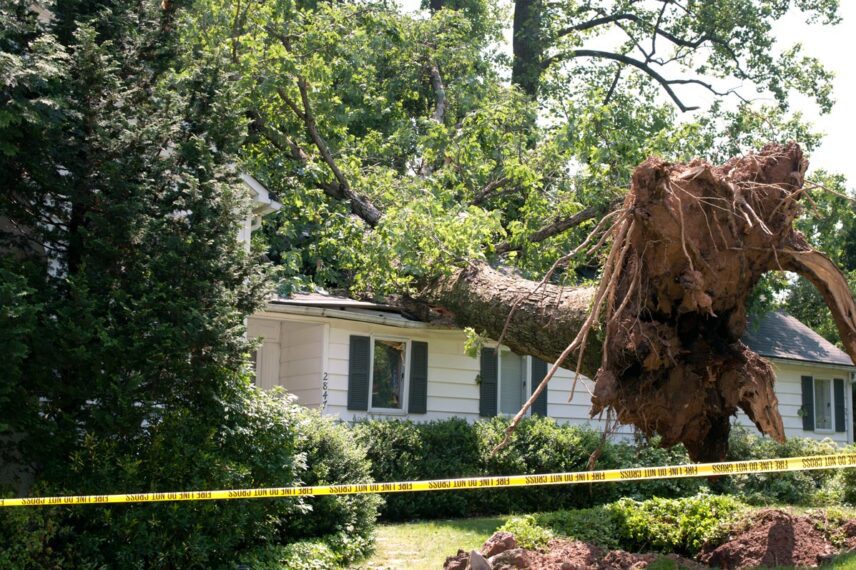Can I Sue if My Neighbor’s Falling Tree Injures Me?

When you step onto someone’s property, the last thing you expect is to be injured by falling hazards like a tree toppling over. However, when it does happen, it can create devastating injuries that leave you bankrupt and drowning in medical bills. In instances like these, tree accidents warrant litigation. But under what circumstances are you able to sue? And what happens if your neighbor’s unruly tree threatens to fall across your own property line?
When a Property Owner is Responsible for a Tree Falling on Their Property
First and foremost, in order to win a premises liability suit, you must have proof that the landowner violated the duty of care that they owed to you when you were on their property and that this breach of care directly led to your injuries.
In South Carolina, landowners are legally obligated to prevent guests from hazardous conditions, including unsafe trees or overhanging tree limbs. However, this doesn’t always mean they have a legal obligation to protect you from dangerous trees— you’ll still have to demonstrate that the landowner was negligent.
Proving a Property Owner Was Negligent in Caring for Their Trees
To prove that a landowner or neighbor acted negligently towards tending to their property involves demonstrating that they “knew or should have known” the tree presented an undue amount of risk, including the potential for harm. Some potential conditions that prove negligence include:
- If their tree had noticeable disease or decay
- If the tree was missing limbs
- If the tree was uprooted
- If the owner had a history of not tending to their property
- If the landowner had previous complaints about the condition of their land
However, if your neighbor’s tree splits during a lightning strike and falls, then it’s doubtful you’ll be able to file suit, as they are protected under the South Carolina “Act of God” defense in most instances.
Can I Cut My Neighbor’s Hanging Tree Branches?
While it may seem like a good solution to cut your neighbor’s overhanging tree branches to prevent potential injury, in South Carolina, it is illegal to trim your neighbor’s tree branches without their explicit permission.
According to the criminal statute, Section 16-11-520, in South Carolina, it is unlawful for a person to “willfully and maliciously cut, mutilate, deface, or otherwise injure a tree, house, outside fence, or fixture of another or commit any trespass upon real property of another.” This statute also says that anyone who violates the aforementioned law can be guilty of a felony offense if the damage totals over $2,000 and can be fined up to $10,000 or more.
Furthermore, Section 16-11-680 specifies, “If any person shall knowingly, willfully, maliciously or fraudulently cut, fell, alter or remove any certain boundary tree or other allowed landmark, such person so offending shall be guilty of a misdemeanor and, upon conviction, shall be fined not exceeding one hundred dollars or imprisoned not exceeding thirty days.”
So What Can I Do if My Neighbor’s Trees Pose a Clear Danger?
There are a few steps you can take to protect yourself against overhanging branches from your neighbor, including:
Assess Your Property Boundary Lines
While you may be clear about where your property lines are, it’s best to have a professional confirm your boundaries, especially if you have a large amount of land. Hiring someone to perform a survey or looking up previous surveys can help to clarify what trees are within your rights to cut down and what are not.
Talk to Your Neighbor
Even if you feel like your neighbor may reject your proposal, it’s essential to ask them if it’s okay to trim trees that fall onto your property lines. There’s a chance you can formulate a compromise that you can both agree to and even if they reject it, this provides an opportunity to document your efforts should the tree cause damage later. Send them a proposal letter explaining why the tree poses a problem and save a copy for later purposes in case you need to take them to court.
Hire an Arborist for Help
An arborist is a tree specialist who can help you determine if your neighbor’s tree is a hazard. If the arborist determines the tree is in danger of falling onto your property, save a copy of their report and give another copy of it to your neighbor. If they still refuse to cut the tree, this may be enough proof to convince a judge to allow you to trim it and will be further proof to utilize in court should the tree end up falling onto your property.
Consult with the Authorities
Understanding your local laws is one of the most crucial things you can do to ensure that you don’t accidentally violate the law. Some places may have protected trees, which can land you in big trouble if you accidentally prune too much and kill, so always make sure your actions are within the confines of the law.
File a Lawsuit
If your neighbor still refuses to trim the problematic tree limbs after taking the above steps, you can attempt to take them to court. A successful suit will grant you the legal right to cut the tree branches down or hire a professional to prune them at the expense of your neighbor rather than your own. For the best chances at a successful claim, hiring a premises liability lawyer will give you a considerable advantage over the defendant.
Conclusion
Falling tree limbs pose a genuine threat to anyone in their vicinity, and serious injuries can occur if left untreated. While the laws in South Carolina can make it frustratingly difficult to maintain overhanging tree branches that belong to your neighbors, you can take several actions to keep you and your loved ones safe, including documenting all efforts to notify your neighbor and hiring a premises liability attorney to file suit if they continue to rebuff your pleas.
When injuries happen due to fallen tree limbs, it’s possible to seek financial compensation if you can provide evidence that your neighbor acted negligently in the upkeep of their trees. Because it can prove challenging to demonstrate negligence, hiring a lawyer as soon as you have difficulty negotiating with your neighbor to maintain their property is the best way to protect yourself and ensure the success of any future lawsuit you may file against them.






